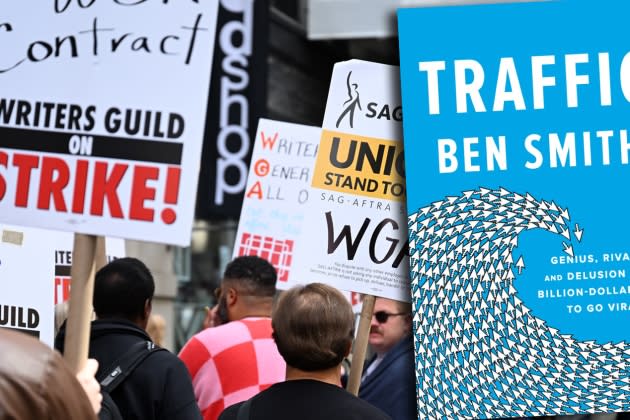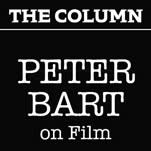Peter Bart: As Film & TV Writers Hit Picket Lines, Some Digital Media Counterparts Are Stuck In ‘Traffic’ Jam


This is a dark moment for frazzled members of the writing fraternity.
Picketers in Hollywood and New York fear a prolonged standoff gripping film and TV. Also troubling, their colleagues in digital media are patching together their résumés as Vice Media and BuzzFeed prepare for crash landings. Will others follow?
More from Deadline
Even a digital zealot like Ben Smith sees the moment as “a humbling experience.” His new book, titled Traffic, vividly revisits the picaresque adventures of the “muckrakers, dweebs and wing nuts” who set out to revolutionize legacy journalism. Some became at once rich and unemployed.
The New York Times liked Smith’s book, even though he quit that paper to start yet another digital adventure called Semafor — its fate still to be determined.
Here’s the irony: While Smith and his social media colleagues are making lots of noise for their next adventures, their colleagues in film and TV are frozen in silence. (For the reason, see below.)
The picket lines themselves provide grim memories of the sad saga lasting five months in 1988. The respected writer Alvin Sargent compared walking the picket lines to “being stuck in an airport bar during a snowstorm — civility mixed with rage.”
Jack Warner, the testy studio chief, observed that “even writers need love, especially when they don’t deserve it.” Warner himself was addicted to firing writers, but he was a fanatic about keeping his studio assembly line humming. That might not happen this time.
“The unity of the big studios or Big Three networks has been shaken,” observes one veteran studio CEO, who recalls that Hollywood’s labor force “now laments the absence of the very oligopoly it once attacked.” There is no Lew Wasserman or Bob Daly to assemble the broken fragments.
Hollywood’s founding fathers were zealous in resisting the efforts of their workers to organize but still were eager to be recognized as patriotic and pro-business. Louis B. Mayer of MGM was so solidly Republican that he even established studio training programs to prod contract players to become good soldiers for the party.
By contrast, the feverishly ambitious cast of characters in Smith’s book would run any story and defy every establishment idea in the wild pursuit of traffic. Characters such as Matt Drudge, Nick Denton, Jonah Peretti, Andrew Breitbart or the early Arianna Huffington all stoked a nonstop celebration of outrage.
Assaults on Bill Clinton propelled millions of impressions, and those, in turn, sucked in advertisers. Denton and Huffington recruited contributors through their high-profile parties. Obscure bloggers like Jessica Coen became unexpected influencers because of social contacts and dogged output. The appetite to connect with ideologues like Rush Limbaugh transformed once-liberal bloggers into heroes of the right.
RELATED: Vice Media Preparing To File For Bankruptcy
The social media traffic even became seductive to Hollywood. Disney invested hundreds of millions in Vice and explored buying the company for $3 billion. The deal never happened. By 2017, Vice was worth $5.7 billion. Today, it is being preparing to file for bankruptcy.
The cast of characters depicted in Traffic, to be sure, has kept re-appearing in new digital dogfights over the years. Denton earned a shady renown thanks to Gawker. Smith was involved in Politico, BuzzFeed and now Semafor, which aims to establish an international reach.
RELATED: BuzzFeed News To Shut Down As Digital Media Company Cuts Workforce By 15%
“I definitely have been too utopian about the new media,” Smith now reflects. “Also about the ability to disrupt establishment media. The task of building and maintaining legacy institutions is more important than I realized.”
While Smith is busily working the interview circuit to promote his book, his colleagues in other sectors of the media are uncharacteristically mute. That’s because under strike rules, written and unwritten, writers are not supposed to engage with their agents, managers or even colleagues. Most important, they’re not supposed to work.
To most citizens, that would be a blessing. But writers need love – even Jack Warner’s.
Best of Deadline
Sign up for Deadline's Newsletter. For the latest news, follow us on Facebook, Twitter, and Instagram.

 Yahoo News
Yahoo News 